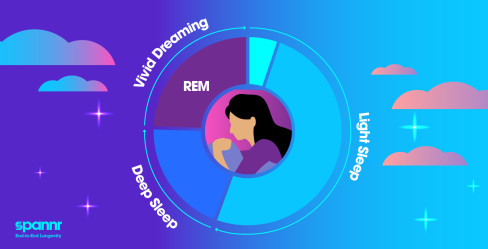Constructive Snoozing: The Connection Between Sleep & Longevity

We aren’t sleeping enough, and it’s hurting our species.
Despite sleep being widely known as a key to health, many of us still struggle to get the optimum quantity and quality of sleep. Whether because of daily stress, an abundance of engaging digital content captivating us, or simply having too much to do without enough hours in the day, the result is apparent.
Why do we still struggle to practice good sleep hygiene despite knowing about the effects on our health and well-being? For many, the short-term pleasure of watching one more show, or reading one more article on your phone outweighs the perceived low-level impacts of grogginess or brain fog the following day.
Recap: How Sleep Improves Health
Here’s a quick overview of how sleep can improve your health:
Sleep helps us to integrate the day’s events while improving our learning and processing functions through increased neuroplasticity.
For active folks, sleep is vital to recovery after exercise or physical strain, with a lack of quality rest directly causing a loss of muscle mass.
On a chemical level, sleep is essential in clearing toxins from the body through the brain’s glymphatic system. This recently discovered bodily process removes neurotoxic chemical accumulation.
Poor sleep is linked with increased rates of obesity, as a recent mid-quarantine study of the effects of a work-from-home lifestyle on sleep and health showed.
Even group cohesion and our essential humanity are affected by sleep. Human altruism degrades as sleep quality or quantity decreases, with 78% of sleep-deprived study participants showing less willingness to help others regardless of whether they were strangers, friends, or family.
Sleep isn’t just good for our health… Emerging research is giving us a new reason to sleep more and sleep better – it can help us live longer.
Link Between Sleep and Longevity
First, based on the known effects of poor sleep, it’s easy to deduce that sleep deprivation can lead to increased all-cause mortality - and numerous studies back this up.
A 50-year study concluded in 2021 showed that fewer than five hours (for men) or eight hours (for women) led to increased mortality across the board when controlled for social factors. The consensus is that this is because poor sleep correlates to increased rates of obesity, heart disease, and related health factors that can cause early death.
What’s more interesting, though, is how sleep can actively increase lifespan rather than simply reducing mortality. It’s a fine line to walk, but it could serve as a motivating factor and call to action for those debating whether a few more hours of work are more important than the same amount of time spent sleeping.
A landmark study found direct links between quantity and type of sleep, and improved longevity. This study explored sleep patterns, also known as sleep architecture. Sleep architecture describes the sequencing of the kinds of sleep (rapid-eye-movement and non-rapid-eye-movement) into phases and cycles.
Through blood testing, questionnaires, and polysomnography (a measurement of brain waves, oxygen, and other physical actions during sleep), the participants examined how sleep may directly lead to a longer life. Qualitatively, the study reinforced many of the oft-quoted sleep tips. They found that, in the oldest and healthiest subjects, they:
- Went to sleep earlier in the evening and woke up earlier in the morning.
- Maintained consistency in both sleep and wake time.
- Napped more often at set times during the day.
- In general, they showed regularity in their approach to sleep.
Looking under the hood using quantitative tools showed some interesting evidence backing up the why behind these good sleep practices. The oldest and healthiest had better lipid profiles than the younger subjects, indicating that sleep maintained these biochemical “shields” for the heart, combatting the onset of heart disease and similar issues.
As the participants aged, the researchers also found that longevity improved when sleep architecture consisted of more slow wave sleep, or regenerative sleep, as the body actively produces more growth hormone during this stage for cellular repair. Slow-wave sleep is also the brain’s opportunity to recover cognitively, implying improved longevity – a fact that other studies sought to explore.
Cognitive Causes
There’s little point in aspiring to be a centenarian if you can’t maintain your mental robustness alongside your comparative physical health. This is true and especially relevant today. As aging science advances, the case for extended bodily longevity improves daily. Some even speculate that we’re seeing the first generation today that may live forever through scientific advancement. But, again, without keeping the cognition intact, there’s no motivation to live forever.
Keeping an active and engaged brain is a primary step in improving longevity, and sleep directly facilitates that end.
Poor sleep is associated with cortical thinning, a biomarker that can indicate Alzheimer’s disease and similar cognition disorders. Furthermore, as both REM and slow-wave sleep are seen as restorative for the brain as it recovers overnight from the day’s activities, if “one sleeps poorly across their lifespan, then that may have cumulative negative effects on […] executive function.” So although one or two nights of low-quality sleep may not knock off years from your life, the compounding effect can increase the likelihood of reduced cognitive longevity.
Another marker of healthy executive function in aging is memory recall, and slow-wave sleep directly affects the brain’s memory processing. Memory is typically tested as a function of encoding and retrieval. Encoding is the primary intake of new information for processing and storage. In contrast, retrieval is (as the name implies) the ability to pull that information out of storage later for reference.
Slow-wave sleep is associated with improved consolidation, as found when many older adults spend less time in slow-wave sleep but compensate with increased REM sleep. A study showed that taking naps after learning a task improved the memory of how to do that task – provided the rest was long enough to enter slow-wave sleep. In that study, those who took a 60-minute nap compared to 30 minutes or no nap had improved “placekeeping,” which measures the retrieval side of memory.
Best Bang for Your Buck: Improve Slow-Wave Sleep
Many guides exist to improve sleep, but few directly address increasing sleep architecture. Most advice that increases sleep duration and length may contribute to longevity through improved glymphatic processes. However, there are fewer proactive steps to target slow-wave sleep, which could play a vital role in late-life cognitive and executive function. Some advice may even impede slow-wave sleep – one study found that melatonin, though beneficial for the duration of sleep, reduced slow-wave sleep.
These are a few of the verified methods of improving slow-wave sleep:
- Reduce alcohol. Studies find that excessive alcohol consumption massively disrupts sleep architecture, with slow-wave sleep being the most affected. Interestingly, the subject had abstained from drinking for 18 days before the study, indicating that alcohol has continued long-term effects even after a period of abstinence. So, if you want to improve slow-wave sleep, cutting out alcohol is critical.
- Exercise. Exercise is often touted as a sleep aid, as physical exertion can mean you’re more tired and sleep longer. But activity is also linked to an improved length of slow-wave sleep. And, if it doesn’t feel like your sleep is better after exercising, don’t worry. This study found that subjective assessment of sleep quality after rigorous exercise was worse than non-exercise sleep, but the EEG analysis showed greatly improved sleep architecture.
- Take L-theanine. L-theanine, a commonly-available supplement also found in green tea, has improved both the onset of sleep and slow-wave sleep.
- Fall asleep to relaxing sounds. Repetitive sounds played “2 minutes before lights were turned off and lasting for 90 minutes” improved the length of slow-wave sleep in adults and is thought to be why lullabies help babies fall asleep reliably.
Those seeking an actionable and measurable way to improve lifespan and longevity can greatly benefit from improving their sleep duration and quality. Try the tips above to get started with improving your sleep hygiene.
And in case you missed it, check out our article on sleep quality versus sleep quantity.
About the Author
Sign Up For Our Newsletter
Weekly insights into the future of longevity
